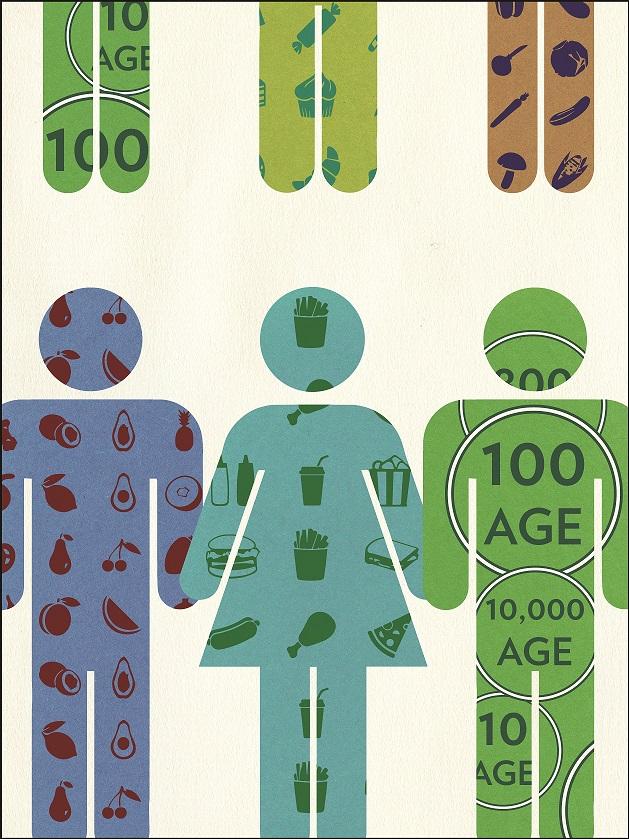Medical University of South Carolina researchers tie higher levels of advanced glycation end products (AGEs) to estrogen receptor (ER)-positive breast cancer; their findings also suggest that AGEs could hamper response to tamoxifen therapy

Credit: Illustration by Emma Vought, Medical University of South Carolina
Poor diet and lack of exercise are associated with cancer development, but the underlying biology is not well understood. Advanced glycation end products (AGEs) could offer a biological link to help us understand how certain lifestyle behaviors increase cancer risk or lessen the likelihood that an anti-cancer therapy will be effective.
AGE accumulation is the natural and unavoidable result of the breakdown of nutrients, sugars and fats. AGE levels, however, can be increased by the consumption of processed foods high in sugar and fat. Certain cooking techniques, such as grilling, searing and frying, also increase AGE formation.
High AGE levels could prevent patients with estrogen receptor (ER)-positive breast cancer from responding to tamoxifen therapy, suggest preclinical findings reported by researchers at the Medical University of South Carolina (MUSC) in a recent issue of Breast Cancer Research and Treatment. The MUSC team was led by David P. Turner, Ph.D., an assistant professor in the MUSC College of Medicine and a member of the Hollings Cancer Center, who is one of the two corresponding authors on the article. Marvella E. Ford, Ph.D., a professor in the MUSC College of Medicine and associate director of Cancer Disparities at Hollings Cancer Center, is the other corresponding author.
“By showing that AGEs in the diet may impact how well breast cancer patients respond to therapy we can make breast cancer patients aware of their existence,” says Turner. “And we can design lifestyle interventions aimed at reducing AGE intake.”
AGEs cause an imbalance between molecules called free radicals and antioxidants, leading to chronic inflammation that can promote the development of a variety of chronic diseases. Furthermore, as AGEs accumulate in our organs, they cause damage that is associated with diseases such as diabetes, Alzheimer’s, cardiovascular disease, arthritis and cancer. However, AGEs have not been studied in depth in the context of cancer.
The publication by Turner, Ford and colleagues shows that elevated AGE levels lead to continual activation of pathways that promote cancer cell growth. A key molecule turned on by those pathways is important in the context of ER-positive and -negative breast cancer. This led the MUSC team to explore how AGE might affect cancer cell signaling in ER-positive breast cancer.
The MUSC team found that AGEs actually increase the phosphorylation (a process that turns on a biological pathway) of a protein called estrogen receptor alpha in a breast cancer cell line model. Adding tamoxifen to the cancer cells prevented their growth. However, adding AGEs caused them to grow once again. This could mean that patients with high AGEs are less likely to respond to tamoxifen treatment.
Turner’s team also found that a defined lifestyle intervention of exercise and dietary counseling lowered systemic levels of AGEs in overweight women with non-metastatic ER-positive breast cancer.
Next steps are to expand the published study to determine the effects of the intervention on a larger scale, while also further exploring the biological pathways in animal models. Together, they should shed light on how lifestyle interventions can beneficially affect cancer treatments by reducing AGE levels.
###
About MUSC
Founded in 1824 in Charleston, The Medical University of South Carolina is the oldest medical school in the South. Today, MUSC continues the tradition of excellence in education, research, and patient care. MUSC educates and trains more than 3,000 students and residents, and has nearly 13,000 employees, including approximately 1,500 faculty members. As the largest non-federal employer in Charleston, the university and its affiliates have collective annual budgets in excess of $2.2 billion. MUSC operates a 700-bed medical center, which includes a nationally recognized Children’s Hospital, the Ashley River Tower (cardiovascular, digestive disease, and surgical oncology), Hollings Cancer Center (a National Cancer Institute-designated center) Level I Trauma Center, and Institute of Psychiatry. For more information on academic programs or clinical services, visit musc.edu. For more information on hospital patient services, visit muschealth.org.
About Hollings Cancer Center
The Hollings Cancer Center at the Medical University of South Carolina is a National Cancer Institute-designated cancer center and the largest academic-based cancer research program in South Carolina. The cancer center comprises more than 100 faculty cancer scientists and 20 academic departments. It has an annual research funding portfolio of more than $40 million and a dedication to reducing the cancer burden in South Carolina. Hollings offers state-of-the-art diagnostic capabilities, therapies and surgical techniques within multidisciplinary clinics that include surgeons, medical oncologists, radiation therapists, radiologists, pathologists, psychologists and other specialists equipped for the full range of cancer care, including more than 200 clinical trials. For more information, visit http://www.
Media Contact
Heather Woolwine
[email protected]
843-792-7669
Related Journal Article
http://dx.




